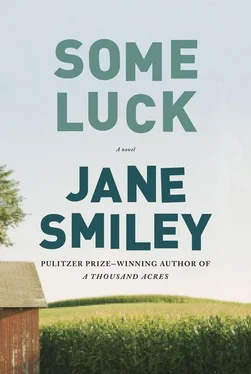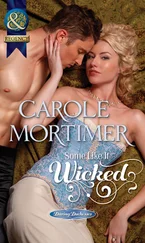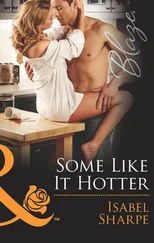Claire did her job, first on one side, then on the other, and the nurse said “Excellent!” and took the baby away for another four hours. Rosanna, who had forgotten to bring a book along, took another nap.
When the nurses weren’t looking, Rosanna got up and walked around, and so she was standing in the doorway when her mother appeared, walking down the white hallway from the far end, where the elevator was. At first she thought her mother was Oma, so slowly did she walk along, with her head down, a little abashed by the grandeur of the stark walls and the tall doors to the rooms. Rosanna couldn’t help stepping back and letting the door of her room close, and then looking at her own reflection in its circular window. Too old to have a baby, wasn’t she? Thirty-nine, almost, her hair a thin bun. Frankie, now nineteen, had filled her out, given her dimples in her cheeks, made her hair grow an inch a month. Claire had drained her. No more, she thought, and then there was a knock.
Her mother had a bag with her. She set that next to Rosanna on the bed and said, “My dear, you look more like you just went shopping than like you had a baby!”
“Well, it’s more like a vacation here than a birth. I hardly know what to do with myself.”
“Enjoy it, enjoy it. They’re already looking out the door at your place, wondering when you’re coming home. Lillian sent you a poem.” Her mother handed her a piece of paper, and she unfolded it: “We send our love to Baby Claire, / So far away. If we were there, / We’d kiss your toes and fingers, too, /Just to show that we do so love you.” Rosanna said, “Has there ever been such a child?”
“Well, you can say that about any child, really. Each one is his or her own little universe.”
Rosanna pressed the button, and, sure enough, a nurse in a white cap and white shoes eased through the door. Rosanna said, “My mother would like to see the child.”
This nurse was one of the nineteen-year-olds. She said, “I don’t know that we can allow that, Mrs. Langdon. The infants are on a strict schedule.”
“I won’t feed her, if you—”
“It’s not just feeding. They benefit from a clear routine.”
Rosanna looked at her mother, then said to the nurse, “What’s your name?”
“I’m Wilma,” said the nurse.
Rosanna said, “My mother here delivered my second baby. I delivered the last one by myself.”
“I’ll get in trouble,” said Wilma.
Rosanna turned to her mother and said, “How did you get here?”
“Grandpa brought me. He went on to the feed store.”
“In the truck?”
Granny Mary nodded.
Rosanna said, “You’re bringing the baby back to me at eleven, right?”
“Yes. Eleven o’clock feeding, then a bath, then a nap. When you leave the hospital Monday, we’ll give you a schedule and instructions.”
Rosanna bit her lip. She said, “Thank you.”
When the nurse left, she said, “What time is Papa coming by?”
“He said to call him at the feed store.”
“Well, call him and tell him eleven-thirty.” She handed her mother the phone beside the bed.
It was the older nurse who tried to stop them. They had gone through the door past the elevator and were starting down the stairs when she ran up from the floor below and placed herself in front of them. She said, “I don’t believe you’re ready to check out, Mrs. Langdon.”
“I am, though. I’m fine.”
“You can’t take the infant out in this cold.”
“Is it going to be warmer in three days?”
“You are being very irresponsible!”
“Taking my own child home to the place where she’s going to live?”
“She’s two days old! Don’t you live on a farm?”
“Look at it this way. She’s been living on that farm for nine months. I’m sure she’ll feel very comfortable there.”
Granny Mary put her hand on the nurse’s arm and encouraged her to step aside. After a moment, she did. Rosanna was pretty tired, actually, when they got to the bottom of those four sets of stairs, but there was her father, the truck at the curb, warm and running. Granny Mary opened the door, and Rosanna got in. Her mother got in after her and slammed the door. Rosanna could see a hospital person, someone in a suit, hurrying down the steps and gesturing. Her father checked the side-view mirror and pulled away from the curb. Rosanna said, “I think this is the closest we’ll ever come to being gangsters.”
“Well,” said her mother, “Papa here did make his own beer all through Prohibition.” They all laughed.
Rosanna said, “I don’t see why all of my births have to be so dramatic.”
Granny Mary folded the blanket away from Claire’s little face. Her eyes were open, but she wasn’t crying. Granny Mary said, “They all have happy endings, though.” When they got to the farm half an hour later (they had to go a little slowly because of the bits of four-day-old snow that had drifted over the roads), Walter was out in the barn with Joey, and Lillian and Henry were playing a game with Lois. The kitchen was cold, the range hadn’t been lit in three days, and Rosanna suddenly missed the dull luxury of the hospital. But she knew this was her life. Better to be immersed in it than to see it from afar.
AT THE END of winter, when the weather was too cold for them to go out for recess, and they had sung all the songs in the songbook, Minnie taught them to sew. They pushed four of the tables together and laid out some fabric on it that Minnie had gotten from Dan Crest — blue and white stripes, and enough for everyone to make something. The hope was that by the time they were all finished with their projects, spring would be in full bloom, and they would be able to wear what they had made.
Blue and white stripes reminded Lillian of mattresses and pillows, but she tried to enter enthusiastically into the project. She would make an apron for herself, one with ruffles over the shoulders, and a smocked pinafore for Lois — Lois could do some of the cutting and sewing, and Lillian would do the smocking, in red. Minnie whispered, “I know this fabric is hideous, darling, but it was all he would give me. He couldn’t sell a yard of it, I’m sure.”
Lillian nodded.
Henry decided to make himself trousers and a vest. The stripes would run downward on the trousers and across on the vest. Lillian said, “Don’t you think that’s a little loud, Henry?”
He grinned.
Jane had decided on a gored skirt, and Lucy on a dress. Lillian thought that everyone was getting a good lesson in making a silk purse out of a sow’s ear, which was what Mama said that you would have to do for your whole life if you didn’t watch out, so it was never too soon to start.
Lillian helped Henry cut the pattern out of butcher paper that Dan Crest had also given them, and she helped him lay it out when it was his turn to use the pins. At six and a half, he was already pretty good at cutting with scissors. All she had to do was show him how to run the back of the blade along the wood of the table. It took him all of one snowy afternoon to cut out his pieces, but that was okay; Minnie had them sit around him and read their book aloud — it was Tom Sawyer .
Mama couldn’t believe they were sewing at school, but Lillian defended Minnie. She said, “All the rest of the year, we run around, and she lets everyone climb trees and play baseball, even though we’re all girls except Henry.”
Mama actually had pins between her lips as she shook her head. She was mending a rip in Papa’s overalls that he’d gotten climbing the fence. Claire was asleep across the room, so they were keeping their voices low.
“Anyway, she makes him add up inches and feet and yards and measure with a tape, and poke his pins in straight. And if he drops the pins, she makes him count the ones he’s got and find the ones he’s lost.”
Читать дальше












